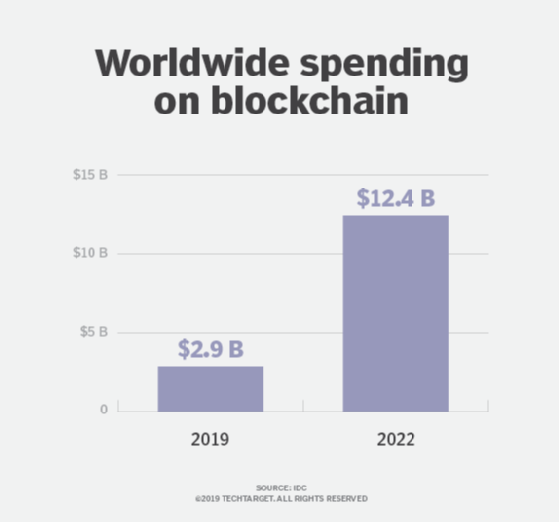
phive2015 - stock.adobe.com
The impact of blockchain in the midst of the COVID-19 pandemic
Organizations across several industries from healthcare to retail are turning to blockchain to help support critical business functions as a result of the pandemic. Here's why.
Blockchain received a big endorsement in 2020 when the Congressional Blockchain Caucus lobbied President Trump and federal regulators to draft the technology in the fight against the coronavirus. Caucus members in a September 2020 letter urged their fellow federal leaders to consider the use of blockchain in the COVID-19 pandemic as a viable offering to ensure identity protection and identification, secure supply chains and authenticate registries, in addition to supporting other critical use cases.
The high-level interest in blockchain isn't an anomaly, even now. The pandemic and the resulting challenges in areas such as the economy, healthcare and the supply chain have exposed significant shortcomings in existing processes and the technology infrastructure that supports them. As a result, officials across various verticals -- from government all the way to retail -- have experienced significant security and visibility issues, among other big gaps.
 Mark Eckerle
Mark Eckerle
Now, several of these officials, like the blockchain caucus, are pushing forward with blockchain initiatives as a way to close those gaps.
"COVID has been a great accelerator for this technology," said Mark Eckerle, a manager at the professional services firm WithumSmith+Brown and leader of its digital currency and blockchain practice.
The value of blockchain technology
According to experts, the accelerated interest in blockchain is expected, noting that the technology's attributes address many of the myriad problems that sprang to the forefront in 2020.
Because blockchain is a type of distributed ledger used for maintaining a permanent record of transaction-based data and managed by computers within a peer-to-peer network, its structure creates a tamper-proof record -- at least theoretically -- making it a particularly secure technology offering.
 Martha Bennett
Martha Bennett
It creates a high level of trust and equity among organizations engaged in the transactions, as well as creates incentive for them to participate.
"A blockchain record is almost impossible to falsify -- the information is accurate," said Martha Bennett, vice president and principal analyst at Forrester Research. "A blockchain-based ecosystem provides a much more equitable way of collaboration."
Blockchain also creates greater transparency, improved traceability and higher accuracy. It's much faster and more efficient than conventional technologies and it costs less, too.
Moreover, it is a technology that works in numerous areas in several sectors and can support financial transactions, data sharing and identity management. As such, it enables a range of actions, including cryptocurrency -- the secure transfer of medical records -- and full visibility into a supply chain.

COVID-19's impact on blockchain adoption
Organizations over the past decade adopted blockchain technology to support contract, supply chain and financial transactions. However, such implementations were considered leading-edge use cases and proofs of concept with some successes and plenty of failures.
Bennett noted that many of those failures stemmed from leaders' enthusiasm for blockchain itself -- the classic problem of investing in technology for technology's sake -- rather than focusing on the business case that needs a better outcome.
The events of 2020 have helped tip that dynamic, experts said, as the government, nonprofits and commercial entities saw long-existing weaknesses in their various processes blow up into crises.
For example, retailers experiencing serious complications in their supply chains, government unemployment agencies coping with fraudulent claims and hospitals trying to securely transfer patient records in the middle of a public health crisis prompted executives to deal with the underlying issues that led to such challenges.
 Melanie Cutlan
Melanie Cutlan
"We're having very different conversations now about how we can move this technology forward, and the number of people tuning in are more significant," said Melanie Cutlan, managing director at professional services firm Accenture and global co-lead for its blockchain and multiparty system business. "[This year] has brought the conversation about blockchain to the forefront."
However, while the use of blockchain in the COVID-19 pandemic is proving to be of value, massive investments haven't been made in the technology yet.
In Forrester's August 2020 report authored by Bennett, "COVID-19 Is Accelerating Critical Enterprise Blockchain Initiatives," she noted that although many organizations pull back on investments in emerging technologies during tough economies, support for distributed ledger technology (DLT) initiatives that have to do with supply chain and logistics have accelerated.
"The same applies to other areas that help firms meet compliance obligations or function more effectively in the 'new normal,'" she said.
A June 2020 report from Everest Group offered a similar outlook, stating that the pandemic and its economic fallout could stifle investments in blockchain short term but added that "in the medium and long term, the pandemic and ensuing economic crisis is a catalyst for acceleration of innovation, as enterprises seek to build resilient and risk-optimized operating models and finding ways to create differentiated value."
COVID-19 pandemic spurs groundwork
The pandemic spotlighted shortcomings in existing processes, but it also pushed organizations further into their digitalization initiatives.
"It has resulted in a degree of digitalization that otherwise would not have been achievable in even three to five years, if we were lucky," Bennett said. "With COVID, because we had to become digital, to figure out remote work and doing things without touching, companies, people and ecosystems had to adapt."
The jump in cloud adoption rates and other such modernization efforts that were required to enable remote work and digital engagements have helped build out the IT foundation required to implement blockchain, experts said.
Meanwhile, COVID-19 and the resulting disruptions showcased how blockchain-enabled processes could outperform those enabled by traditional technologies, further incenting executives to consider where DLT could benefit their organizations.
"We're starting to see some of the larger companies [that] adopted the technology earlier see the benefits come to fruition," Eckerle said. "And more cloud adoption and the other changes in tech infrastructure, that have helped pave the path for blockchain technology."
Cutlan said organizations are now exploring where blockchain can improve existing processes as well as where it can enable new activities and requirements.
For example, she said blockchain could get government stimulus money to recipients faster, cheaper and more securely than direct deposits and old-fashioned paper checks. It can support digital passports that show individuals' proof of COVID-19 vaccinations or immunity status. It can also bring efficiencies to supply chain, identity management and other business areas at a time when companies are facing significant pressure to cut costs.
Others cited blockchain as an enabling technology for work specific to COVID-19, stating that it is a way to improve clinical trial data management, share public health data, minimize disinformation and track fundraising efforts.
Such benefits create a compelling argument for blockchain in the COVID-19 pandemic, experts said, and they have a broad spectrum of leaders, from Congress to private industry, now pushing for more investments in the technology to address a range of problems.
"We're seeing so much excitement about unlocking the value that's there," Cutlan said.








